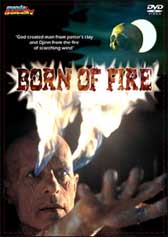 BORN
OF FIRE (1983)
BORN
OF FIRE (1983)Director: Jamil Dehlavi
Mondo Macabro
 BORN
OF FIRE (1983)
BORN
OF FIRE (1983)Disfigured relatives, a fallen angel that can shoot fire out of his eyes, a woman who gives birth to a giant moth and a flute duel worthy of a Charlie Daniels tune; it certainly sounds like a Mondo Macabro release. Visually arresting with a masterful use of sound design and composition, BORN OF FIRE is a journey for the senses. It’s also very, very weird. Rife with symbolism and allegory, I would liken the film to Alejandro Jodorowsky's THE HOLY MOUNTAIN, in that I often had no idea what was going on, but was nevertheless fascinated watching it all unfurl.
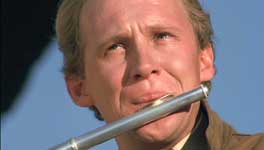
In the midst of performing an evening concert, Paul (Peter Firth, LIFEFORCE), a skilled flute player, begins to have strange visions, accompanied by auditory hallucinations, that draw him away from his recital and to the bedside of his dieing mother. It is there that he learns of his late father’s journey to Turkey. A fellow flutist, Paul’s father traveled to Turkey seeking the guidance of the Master Musician (Oh-Tee), with the desire of further honing his craft, but was never heard from again. After burying his mother, Paul decides to follow in his father's footsteps and travels to Turkey in search of answers and the Master Musician.
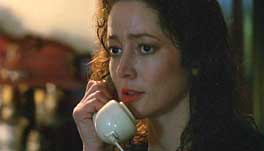 Upon
his arrival, Paul meets Bilal (Stefan Kalipha), the only local willing to guide
him along his journey, or even speak to him for that matter. Brought to an abandoned
Christian church, huddled within a cave, Paul is startled at the sight of a
deformed little person, scurrying across the rocks and sand. Known as The Silent
One (Nabil Shaban, CHILDREN OF MEN), Paul later discovers that the poor creature
is in fact the offspring of his father and a woman with whom he took as his
bride. Searching caves and deserts in his quest for the Master Musician, Paul
is aided by a female astronomer (Suzan Crowley) who has traveled to Turkey to
visit a volcano she believes has been awaken by a recent eclipse. Bearing a
striking resemblance to his father’s Turkish mistress, the woman also
finds herself the victim of hallucinations and possible manipulation of an ancient
Djinn, a supernatural being born of fire. Lost in a dizzying daydream of resurfacing
memories and past lives, Paul slowly begins to recognize that if he doesn’t
stay alert and remain diligent he too might find himself in a similar situation
as his missing father.
Upon
his arrival, Paul meets Bilal (Stefan Kalipha), the only local willing to guide
him along his journey, or even speak to him for that matter. Brought to an abandoned
Christian church, huddled within a cave, Paul is startled at the sight of a
deformed little person, scurrying across the rocks and sand. Known as The Silent
One (Nabil Shaban, CHILDREN OF MEN), Paul later discovers that the poor creature
is in fact the offspring of his father and a woman with whom he took as his
bride. Searching caves and deserts in his quest for the Master Musician, Paul
is aided by a female astronomer (Suzan Crowley) who has traveled to Turkey to
visit a volcano she believes has been awaken by a recent eclipse. Bearing a
striking resemblance to his father’s Turkish mistress, the woman also
finds herself the victim of hallucinations and possible manipulation of an ancient
Djinn, a supernatural being born of fire. Lost in a dizzying daydream of resurfacing
memories and past lives, Paul slowly begins to recognize that if he doesn’t
stay alert and remain diligent he too might find himself in a similar situation
as his missing father.

In an interview, included in the extra features on this release, Jamil Dehlavi makes mention of his being drawn to cinema due to its ability to blend together all other forms of art. Such a perception is unmistakably evident and on full display in BORN OF FIRE, as the plot is clearly secondary to staging. The Turkish landscapes on display, including waterfalls, caves and abandoned religious congregations, are nothing short of breathtaking. Shots of scenery are often worthy of framing and accompanied by an effectively somber score, help set an otherworldly tone that places the proceedings in an almost trancelike setting. Symbolism is also paramount throughout the picture, adding to its mystical nature, as does the film's use of Islamic theology, such as the character of Iblis or Shaitan, the Christian equivalent to Satan.
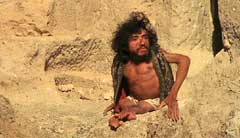 Produced
by Film Four International, BORN OF FIRE is an experience best summarized as
bizarre. It takes awhile for the film to get going but once Paul sets his feet
down in Turkey things begin to get weird at an alarming rate. In searching for
the Master Musician, Paul is in effect walking into a trap, one that is baited
with images from his father's past and triggered by a woman whose intentions
are not all together clear. The picture is at its fundamentals fairly easy to
follow, as the concept of light versus dark, fire versus water, good versus
evil, is clearly the overlying conflict. However, no easy answers are given
as to who is on which side and exactly what is at stake. The experience is open
to suggestion, as the film's goal appears to be to incite emotion through images
and sound rather than constructing a clear narrative.
Produced
by Film Four International, BORN OF FIRE is an experience best summarized as
bizarre. It takes awhile for the film to get going but once Paul sets his feet
down in Turkey things begin to get weird at an alarming rate. In searching for
the Master Musician, Paul is in effect walking into a trap, one that is baited
with images from his father's past and triggered by a woman whose intentions
are not all together clear. The picture is at its fundamentals fairly easy to
follow, as the concept of light versus dark, fire versus water, good versus
evil, is clearly the overlying conflict. However, no easy answers are given
as to who is on which side and exactly what is at stake. The experience is open
to suggestion, as the film's goal appears to be to incite emotion through images
and sound rather than constructing a clear narrative.
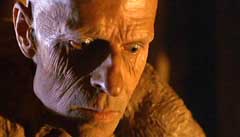
Mondo Macabro presents BORN OF FIRE with a brand new digital, anamorphic widescreen (1.85:1) transfer taken from the negative. Picture quality is quite crisp, with sharp and well defined detail throughout. There is hardly a blemish to be found and coloring and flesh tones appear lucid and lifelike. The Dolby Digital Stereo English audio presentation is likewise as strong. The film’s original score by Kudsi Ergüner and Colin Towns, adds as much to the final product as do the performances of its actors and as such is provided a solid platform in which to shine with this release. Dialogue is for the most part on par with the rest of the disc’s clear sound design however it does drop out slightly after the 10th chapter stop. The Chapter Selection screen lists 10 chapters, but there are in fact 14.
 Special
features include five brief essays about the film, its writer/director Jamil
Dehlavi, and actors Peter Firth, Nabil Shaban and Suzan Crowley, all written
by Mondo Macabro’s head honcho, Pete Tombs. Jamil Dehlavi sits down for
a 15-minute interview in which he covers the film's shoot, his career and the
evolution of his style. Peter Firth also gets an interview segment that runs
just over twelve minutes but it is Nabil Shaban’s segment that proves
to be the most entertaining and enlightening. For over 30 minutes, Nabil’s
recollection of behind-the-scenes events are fascinating. From the slack special
effects crew, dubbed the “special defects crew” by Nabil, to the
time actor Oh-Tee almost went up in flames, Nabil’s interview is really
quite captivating. He also provides a clear cut, plain English synopsis of the
film that even the director admitted was news to him. A full frame, minute and
forty six second trailer for the film is also included. Baring the Vidmark logo
(who released the film on VHS in the U.S.), the trailer is comprised of still
shots, many of which appear to be production or press photos. The Mondo Macabro
promo reel is of course also included. (Jason McElreath)
Special
features include five brief essays about the film, its writer/director Jamil
Dehlavi, and actors Peter Firth, Nabil Shaban and Suzan Crowley, all written
by Mondo Macabro’s head honcho, Pete Tombs. Jamil Dehlavi sits down for
a 15-minute interview in which he covers the film's shoot, his career and the
evolution of his style. Peter Firth also gets an interview segment that runs
just over twelve minutes but it is Nabil Shaban’s segment that proves
to be the most entertaining and enlightening. For over 30 minutes, Nabil’s
recollection of behind-the-scenes events are fascinating. From the slack special
effects crew, dubbed the “special defects crew” by Nabil, to the
time actor Oh-Tee almost went up in flames, Nabil’s interview is really
quite captivating. He also provides a clear cut, plain English synopsis of the
film that even the director admitted was news to him. A full frame, minute and
forty six second trailer for the film is also included. Baring the Vidmark logo
(who released the film on VHS in the U.S.), the trailer is comprised of still
shots, many of which appear to be production or press photos. The Mondo Macabro
promo reel is of course also included. (Jason McElreath)